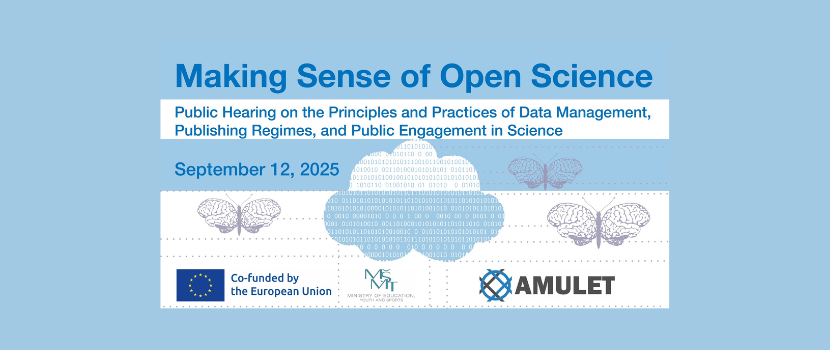
How to make sense of open science?
On September 12, 2025, you will have a unique opportunity to immerse yourself in the world of Open Science at a public hearing in the main building of the Czech Academy of Sciences! The event is held under the auspices of the Scientific Council of the Czech Academy of Sciences as part of the OP JAK AMULET project.
The public hearing will focus primarily on issues of data management, publishing regimes, and making science accessible to the public, offering panel discussions, workshops, and a presentation of sociological research. The meeting is intended for the academic community, policymakers, representatives of key institutions in the domestic scientific community, and interested members of the general public.
In addition to summarizing current developments in open science and future prospects, the discussions will also focus on the links between the principles of open science and the credibility of science, institutional resilience, and the use of new digital technologies. One of the key topics will be the relationship between the principles of open science and scientific integrity and ethics. “An example of this is open data, which we use to document that researchers are playing by the rules,” adds Patrik Španěl, a member of the Academic Council of the Czech Academy of Sciences.
Foreign guests participating in the panel discussions will include Louise Bezuidenhout (Leiden University) and Reese Richardson (The Collection of Open Science Integrity Guides project). Patrik Španěl (Academic Council of the Czech Academy of Sciences) and Dagmar Hanzlíková (Center for Open Science Support, Charles University) will discuss the Czech path to implementing the principles of open science in the areas of open access, open and FAIR data, and making science accessible to the public.
“The public hearing will also include a presentation of the results of a sociological study conducted as part of the OP JAK AMULET project, which focuses on the reflection of open science by the domestic research community, including the opportunities and problems that the implementation of open science principles brings to their everyday research practice,” said Tereza Stöckelová about the public hearing program.
Workshops for the scientific community in English will include, for example, working with electronic laboratory notebooks (Marek Cebecauer, Eguia Marquez Graciela, Gonzalez Navarro Jose Alfredo, ÚFCH JH), the open-source platform Data Stewardship Wizard (Kryštof Komanec, DSW), and the topic of science communication with the public (Květoslava Stejskalová, ÚFCH JH). In the parallel program in Czech, participants can look forward to a discussion game called Dilemma on Academic Ethics and Integrity (Irena Kozmanová, MUNI, UK).
“The meeting will culminate with the presentation of the results of an accompanying activity in the form of an interactive deliberative online forum on selected issues of implementing the principles of open science in the Czech Republic,” concludes event coordinator Michal Trčka.
The public hearing will take place on Friday, September 12, 2025, from 9 a.m. to 6 p.m. in the main building of the Czech Academy of Sciences on Národní třída in Prague. Refreshments will be provided for participants.
Register to participate by August 31, 2025, HERE. The event is free of charge for participants.
The event is organized as part of the OP JAK AMULET (Advanced MUltiscaLe materials for key Enabling Technologies) project, under the auspices of the Scientific Council of the Czech Academy of Sciences, in cooperation with the Open Science Department – Library of the Czech Academy of Sciences, v. v. i. and the Center for Open Science Support at Charles University.
The main coordinator of the AMULET project is the J. Heyrovský Institute of Physical Chemistry of the Czech Academy of Sciences, v. v. i., with the Faculty of Science of the University of Jan Evangelista Purkyně in Ústí nad Labem being one of the eight participating partner institutions. The members of the consortium, together with the University of Ústí nad Labem, are the Institute of Photonics and Electronics of the Czech Academy of Sciences, v. v. i., the Institute of Physics of the Czech Academy of Sciences, v. v. i., the Institute of Organic Chemistry and Biochemistry of the Czech Academy of Sciences, v. v. i., the Faculty of Mathematics and Physics and the Faculty of Science of Charles University, the Institute of Nuclear Physics of the Czech Academy of Sciences, and the University of Chemistry and Technology in Prague.
The project received financial support from the Jan Amos Komenský Operational Program of the Ministry of Education, Youth and Sports and is co-financed by EU funds.